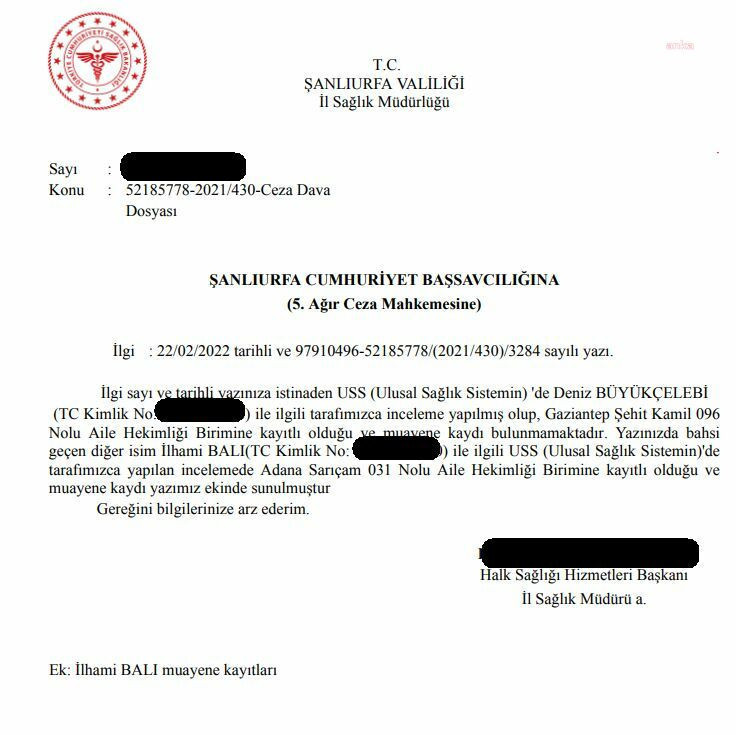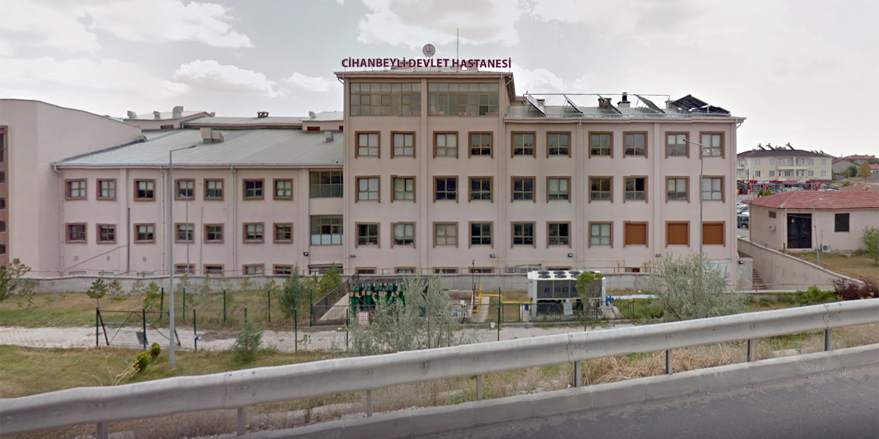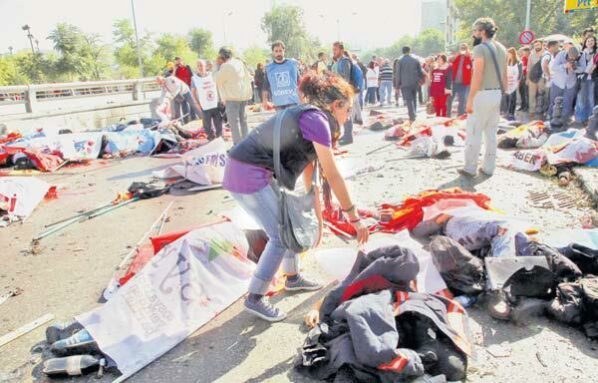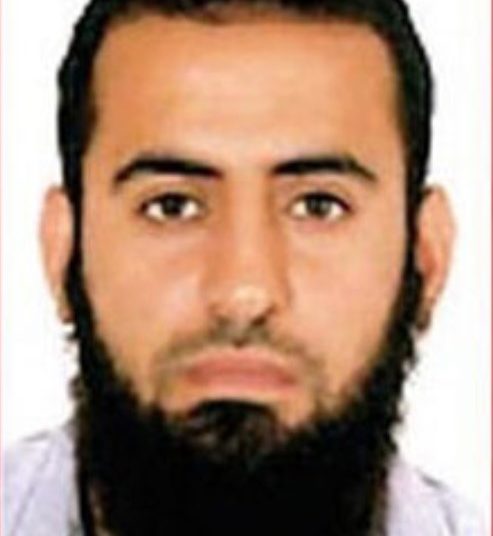Levent Kenez/Stockholm
It has been revealed that Islamic State in Iraq and Syria (ISIS) commander İlhami Balı, better known by his nom de guerre Abu Bakr or Ebu Bekir, who is held responsible for organizing bloody suicide bombing attacks in Turkey, received treatment at a state hospital in Konya on July 25, 2016 despite the fact that he was wanted by INTERPOL on a Red Notice. Balı has not yet been caught.
The scandal emerged with an official letter sent by the Ministry of Health to the relevant court regarding a suicide bomb attack carried out by ISIS on July 20, 2015 that killed 33 people in the Suruç district of Şanlıurfa, Turkish media reported. Balı is being tried in absentia as the mastermind of the attack.


According to information in Turkey’s National Health System, Balı, a Turkish citizen, was registered at a health clinic in Adana , a city in southern Turkey, and three procedures were performed in the “emergency internal medicine intensive care” unit at Konya Cihanbeyli State Hospital in central Turkey on July 25, 2016.

A Nordic Monitor study shows that there is no information about an ISIS or security force operation at the time. The fact that Balı was treated at the hospital 10 days after a failed coup on July 15, 2016 brings to mind allegations that ISIS militants engaged in acts of violence to support the government during the coup attempt. Balı may have sought treatment on his own after he was injured and his condition worsened. The place where Bali was treated is noteworthy for its proximity to Ankara and Kazan, where armed conflicts took place during the coup attempt. Despite being wanted by a Red Notice, it is not known how Bali was treated without hiding his identity. In Turkey, police officers are on duty round the clock in the emergency rooms of state hospitals to follow up on criminal incidents. Health officials also have an obligation to report these cases. It may also be that the criminal records check system did not provide any warning after Balı’s name was digitally recorded.
This claim that Bali was in Turkey in 2016 is not the first. In an intelligence report published earlier by Nordic Monitor, it was stated that Bali stayed in a hotel under the control of Turkish intelligence in Ankara on May 25-27, 2016.
The secret information note compiled on Balı:
According to a secret note compiled by police intelligence, Balı, who was indicted on charges of masterminding the ISIS attacks in 2015, met secretly with National Intelligence Organization (MİT) agents in the Turkish capital in 2016. The information note — whose authenticity was verified during interviews with people who worked in the security branches of the Turkish government and have expertise in terrorism and intelligence matters — suggests Balı’s actions were directed by MİT, which coordinated clandestine operations within ISIS for political goals.
Police investigators discovered that Balı stayed at the then-newly-built, five-star Ankara Söğütözü Anadolu Hotel for three days between May 27 and 29, 2016, courtesy of MİT despite multiple outstanding arrest warrants issued by Turkish courts. He was protected by MİT agents the entire time and was not allowed to leave his room from the beginning of his stay. His handlers in the hotel were Serhan Albayrak, a contract agent who worked on the Syria desk at MİT, and Ahmet Özçelik, a translator on the Iraq desk. During his stay Balı had talks with İlhan Kaya, the MİT station chief in Erbil (who currently leads the special operations desk), and other personnel from the Syria desk. He shaved his beard and wore jeans and a T-shirt to avoid attracting any attention, the note explains.
In 2019 three deputies from the main opposition Republican People’s Party (CHP) and the pro-Kurdish Peoples’ Democratic Party (HDP) asked Vice President Fuat Oktay and Interior Minister Süleyman Soylu whether the claim was true or not. Neither Oktay nor Soylu answered the question. MİT as expected neither confirmed nor denied the report; however, it would have been more than willing to respond had it been fake news.
Balı, born in Reyhanlı in the Turkish border province of Hatay on March 17, 1982, was operating in an al-Qaeda cell before joining the al-Nusra Front in the initial years of the conflict in Syria. A Turkish court had previously convicted him — in an investigation predating the 2011 Syrian crisis — on charges of membership in al-Qaeda and sentenced him to three years in prison. Balı relocated to Syria in 2012. He later moved to ISIS, which tasked him with serving as the ISIS border chief (emir) responsible for the smuggling of jihadists and logistical supplies and the transfer to Turkey of wounded ISIL militants along the Turkish-Syrian border.
On July 20, 2015, 33 people lost died in a suicide bomb attack in the Suruç district of Şanlıurfa province. On October 10, 2015, 103 people were killed in a bomb attack on a crowd gathered in front of the Ankara Train Station. Those who lost their lives in both attacks were HDP sympathizers.
Balı is on trial in absentia as the mastermind of both attacks. The negligence of the security forces was discussed widely in the media for a long time, but the government denied the allegations, taking no official action against those responsible.

In the general elections of June 7, 2015, the ruling Justice and Development Party (AKP) lost its majority and was unable to form a government on its own for the first time since 2003. While it was predicted that a coalition government would be formed, a new election on November 1, 2015, was declared per the constitution by President Recep Tayyip Erdoğan, who undermined the coalition negotiations. Between June 7 and November 1, 862 people, including security officers, civilians and outlawed Kurdistan Workers’ Party (PKK) militants, lost their lives in Turkey.
Following the terrorist attack at the Ankara Train Station, then-prime minister Ahmet Davutoğlu said the popularity of the governing Justice and Development Party (AKP) had increased in the aftermath of the incident. Appearing on public television, Davutoğlu said the government could not arrest suicide bombers until they acted, even though the government had a list of names of potential suicide bombers.
Ousted from the government and made a pariah within the ruling party over a power grab with Erdoğan, Davutoğlu said if he were to reveal what happened between the two elections in 2015 with respect to terrorism, those who criticize him would be ostracized. “If the books on the fight against terrorism are opened, people who criticized us won’t be able to show themselves in public,” Davutoğlu said on August 23, 2019. It was not clear what he was implying, but the Turkish opposition called on him to reveal what he knew about the period in 2015 that was marred by back-to-back terrorist attacks.












